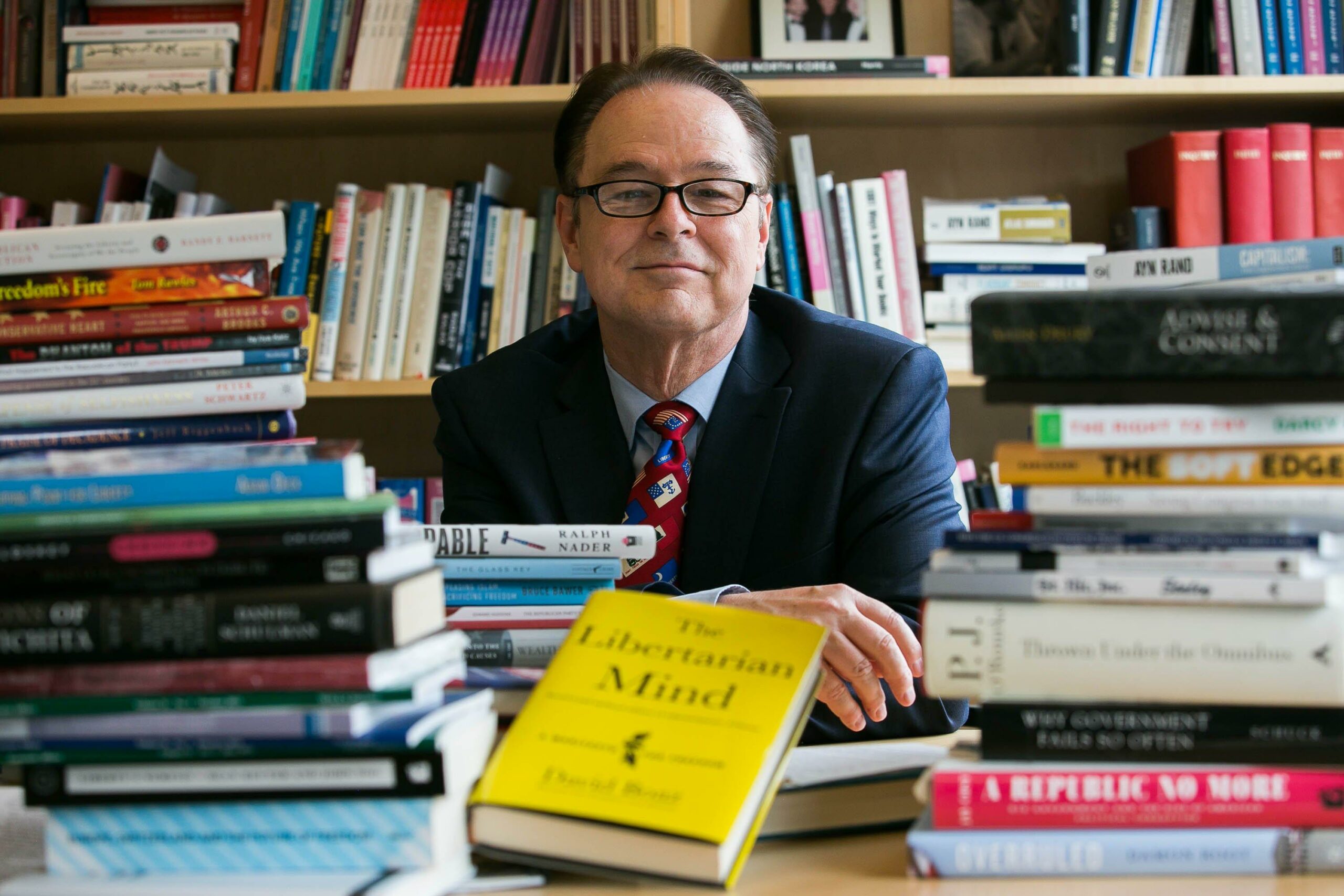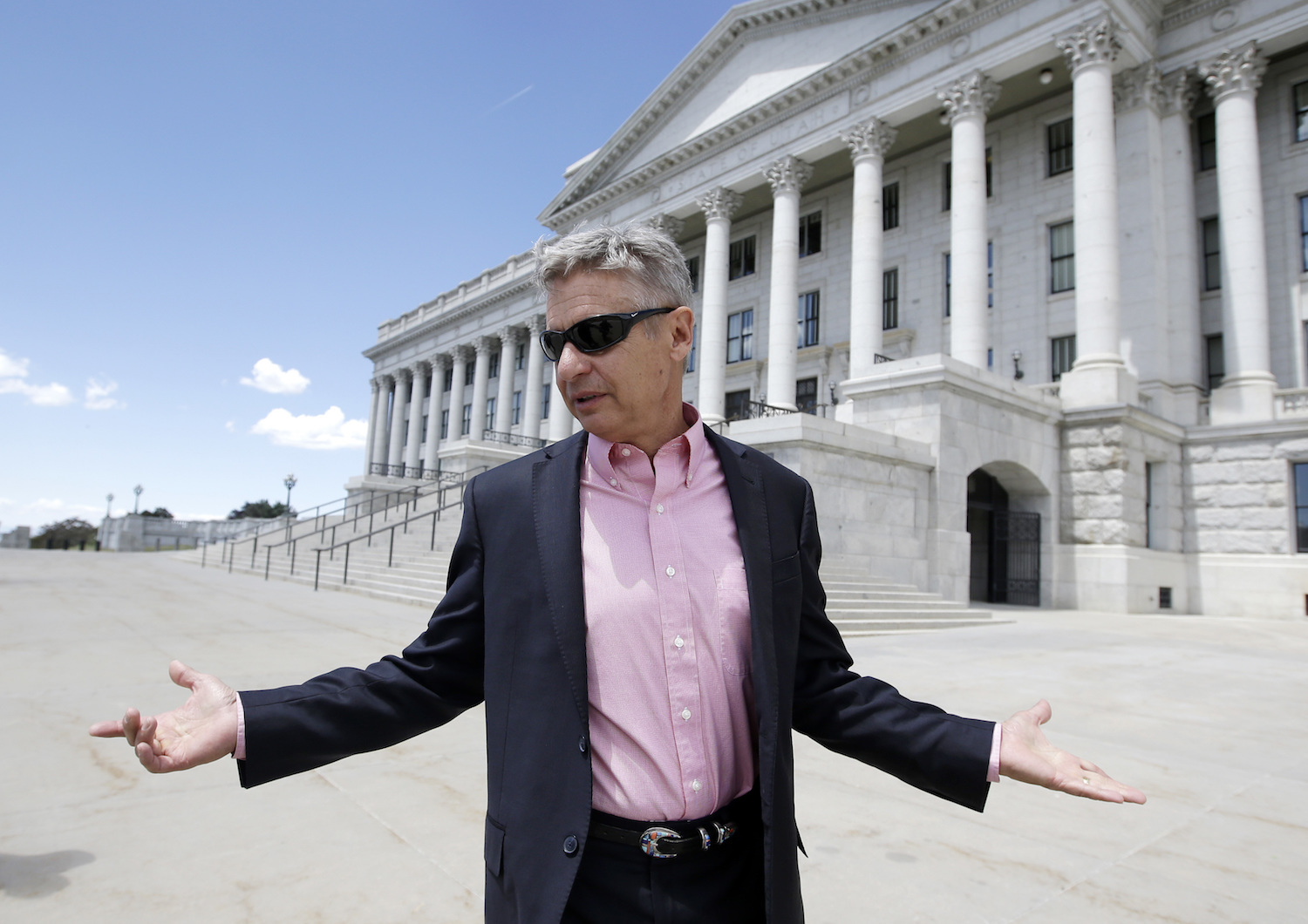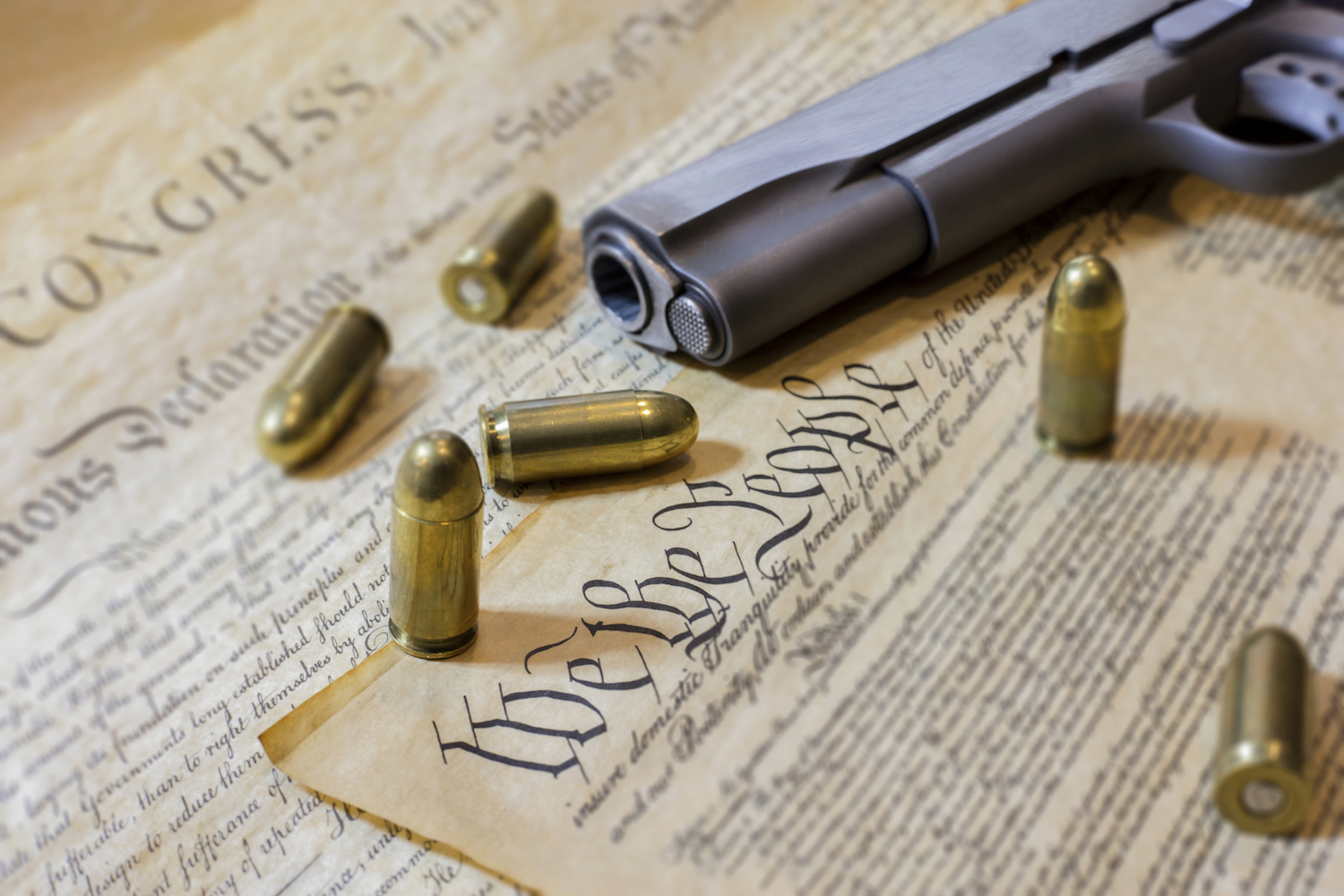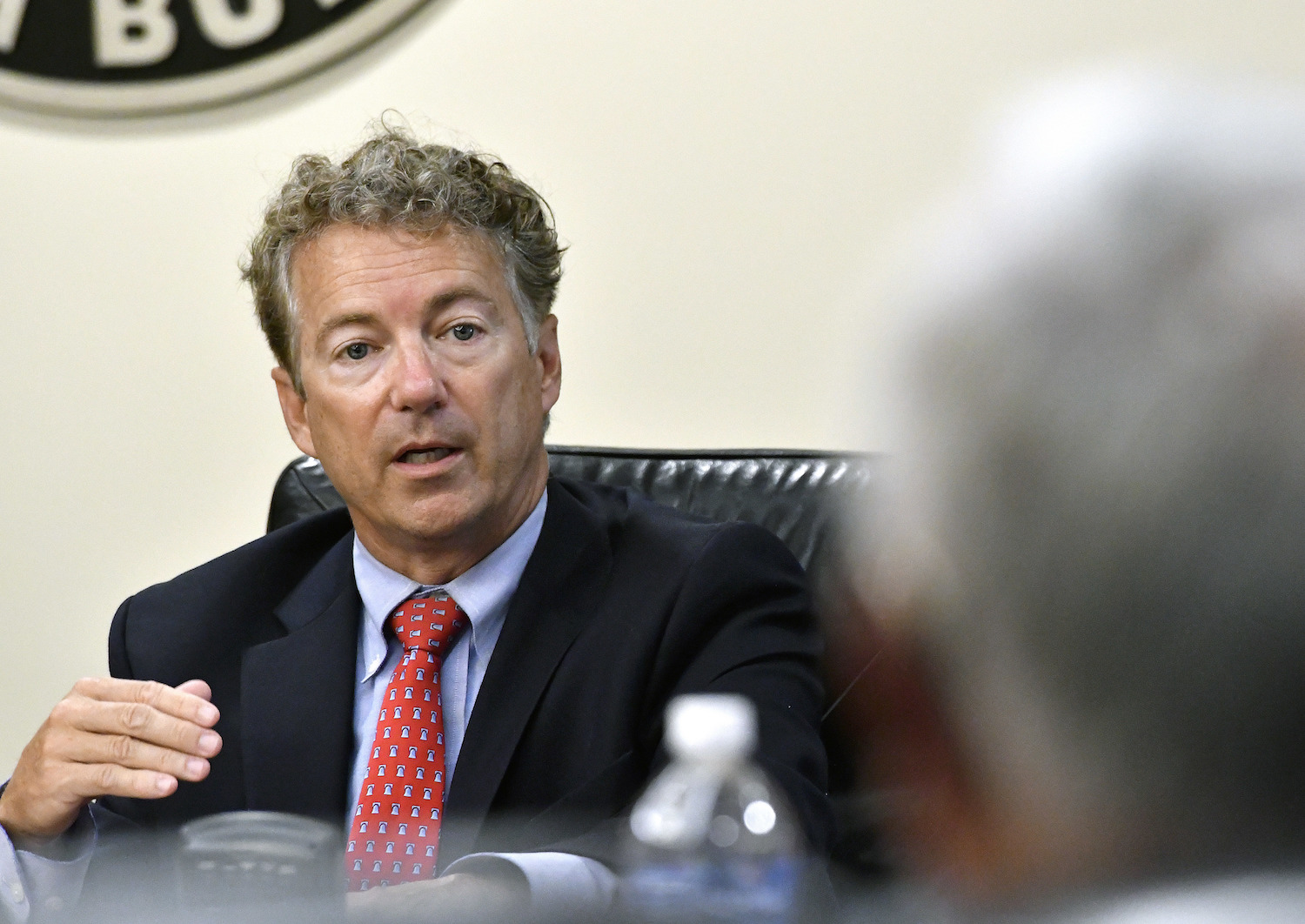Outside elective office, few people have shaped a political movement as much as David Boaz has influenced libertarianism. Over nearly four decades of political engagement, Boaz has fostered the libertarian message in the United States, carried it across continents, and brought it to some of the world’s most hostile foreign lands.
Boaz, now one of the godfathers to the modern libertarian movement, joined Washington, D.C.’s libertarian Cato Institute as its vice president for public policy affairs in 1981, a position that evolved into his current role as executive vice president.
In that time, Boaz notes, he’s witnessed liberalization take place in some of the world’s most authoritarian regimes, in both an abstract and literal sense.
“In 1988 we held what was surely the first conference on free markets, limited governments and the rule of law in China,” Boaz told the Washington Examiner.
“I don’t know that China had ever had a conference on free markets and individual liberty. We took Milton Friedman and George Gilder and some other people to China. We hooked up with maybe the second biggest university there, and we had an incredible conference.”
Cato built on that success with a similar trip to Moscow in 1990, just after the fall of the Berlin Wall. Several high-profile victories followed in subsequent years, including the Supreme Court’s 2008 Heller decision, which declared that citizens in the nation’s capital had a right to wield handguns within their own homes.
The tumult of 2016 has additionally made the upcoming election look more promising for the libertarian movement than perhaps any in memory, since the party’s presidential ticket is one of the most significant beneficiaries.
Surveys have consistently shown the party’s presidential candidate and and his running mate, respectively former New Mexico Gov. Gary Johnson and former Massachusetts Gov. Bill Weld, garnering support from nearly 10 percent of voters.
Boaz said that while he supports the party’s ticket, that support is in part a product of their lean toward the center. “They are clearly running as moderate libertarians. They governed as quite libertarian Republicans. But the standard in the Republican Party is different from the standard in the Libertarian Party. They’re running as moderate libertarians.
“I’m not really a moderate libertarian,” Boaz added. “If I were running for president, I’d be a much more forthright, hardcore libertarian. And I wouldn’t be getting 10 percent of the vote. So I think that’s kind of the tradeoff.”
Regardless of the election’s outcome, which Boaz acknowledges will likely be unfavorable to his cause, he said that his agenda, and that of his organization, will remain focused on personal liberties and spending in Washington.
“Everybody in Washington knows [spending] is a problem, knows it’s unsustainable, [but] very few people will do anything about it,” Boaz said.
“The very first book the Cato Institute published was on moving Social Security from an essentially unsustainable model to a system of private accounts. We’re still talking about that. We still think that’s the best way to preserve retirement security for Americans.”
Washington Examiner: How did your career in the libertarian movement begin?
Boaz: I guess like a lot of libertarians, I started out a conservative. My father was kind of a Jeffersonian conservative Democrat in Kentucky. That’s what I learned first.
But then I read a few books, like the Conscience of a Conservative by Barry Goldwater, which is actually a very libertarian book, and Economics in One Lesson by Henry Hazlitt, then Atlas Shrugged. By that point I was pretty much a libertarian.

Regardless of the election’s outcome, which David Boaz acknowledges will likely be unfavorable to his cause, he said that his agenda will remain consistent. (Graeme Jennings/Washington Examiner)
But there weren’t any jobs for libertarians. So I came to Washington and worked for Young Americans for Freedom and edited their magazine, but became increasingly uncomfortable with the differences between libertarians and conservatives.
So when I heard there was a Libertarian Party campaign and no politically competent libertarians in America to run it, I took that job and met people who would eventually hire me at the Cato Institute.
Examiner: What was the first presidential race you worked on?
Boaz: At some level, when I was 11 years old, I played Barry Goldwater in our fifth-grade election. So that’s the first one I was involved in. In 1976, I worked for the Reagan campaign. I was in Kansas City cheering for Reagan when he lost the narrowest convention in recent history.
But I was actually employed for the first time in 1980 in Ed Clark’s Libertarian Party campaign, and wrote his campaign book, or much of it, and a couple of his campaign papers and so on. Then for the last couple of months I traveled with Ed Clark. This was a presidential candidate who had only two people travel with him, not 200.
Examiner: How did that lead to you joining Cato in 1981?
Boaz: Ed Clark lost, so I was unemployed, and at that point I got hired to join the Cato Institute, which at that point was in San Francisco, mostly because that’s where the founder and president wanted to live.
I already lived in Washington and didn’t want to go to San Francisco, but I did, because I got a job there. Then it turned out San Francisco is wonderful, and if I stayed more than nine months, I might never have left.
When we decided to move from San Francisco to Washington, we invited many of the employees to come with us, and virtually all of them said no. They wouldn’t leave San Francisco.
Examiner: How did you evolve personally, and how has the libertarian movement evolved between 1980 and the present?
Boaz: My evolution has basically been, Cato has gotten much bigger. It was really small when we were out in San Francisco, and when we moved to Washington, Ed Crane and I were the only people who came to Washington. We had about 15 employees once we hired people in Washington.
Now we have about 150. So the evolution for me has been helping the CEO to manage all of that growth, and to build it, and to find more policy people, scholars to write for us, all of that sort of thing.
At the same time, I think the libertarian movement has also been growing. We were the only big libertarian organization back then. The Libertarian Party was a small party, which it sort of still is, but it’s doing better this year.
I think there are now thousands, tens of thousands of people who feel some active involvement in the libertarian movement. Nine years ago, there was no national libertarian student organization. Now there are two: Students for Liberty and Young Americans for Liberty.
And indeed, it’s an international movement, because it was young libertarians in Brazil who started the campaign about a year ago that just resulted in the impeachment of the president there. So arguably Brazil has a more successful libertarian movement than we do.
Examiner: How has this year been for libertarianism?
Boaz: In some sense in policy and politics, this has been a terrible year for libertarians because the major parties have nominated two candidates who are, for very good reason, the most unpopular candidates in the history of polling.
The Democratic Party has nominated an unremitting statist, whether you’re talking about free speech or the military or taxes and spending. Hillary Clinton always thinks bigger government is a better idea.

Surveys have consistently shown the party’s presidential candidate and and his running mate, respectively former New Mexico Gov. Gary Johnson and former Massachusetts Gov. Bill Weld, garnering support from nearly 10 percent of voters. (AP Photo)
The Republican Party has nominated a guy, obviously, who campaigned primarily on protectionism and anti-immigration sentiment, and so also not very appealing to libertarians.
What that has led to, of course, is seemingly the most visible and successful Libertarian Party ticket in history. The Libertarian Party did something that third parties don’t normally do. They nominated two former governors for president.
It’s the first time two former governors have run on the same presidential ticket since 1948 with Thomas Dewey and Earl Warren. So they had a better ticket than usual, and the times are right for people to be looking for an alternative.
Examiner: Why didn’t Rand Paul’s candidacy go further?
Boaz: One answer is, nobody’s candidacy went very far because Trump turned out to be incredibly more successful than people expected. He sucked up all the oxygen.
To the extent that Rand Paul would’ve campaigned as an outsider with some different kind of ideas from Trump, but still an outside-Washington challenge to the ruling establishment, Trump kind of took that space.
I think Rand Paul has been a very good senator, but I don’t know that he was a great presidential candidate. I don’t think he likes campaigning nearly as much as he likes working in the Senate and trying to improve public policy directly.
Examiner: So you like Gary Johnson and Bill Weld?
Boaz: I do like them. I co-wrote a paper on the libertarian movement in America 10 years ago … One of the things we said in there was, we identified the three most libertarian governors of the past couple of decades. We identified the brilliant lawyer William Weld, the true citizen politician Gary Johnson and the eccentric entertainer Jesse Ventura.
So leaving aside the eccentric one, two of the three are now on a ticket together. So I think they’re presenting a real challenge in a way that third parties almost never do.
Examiner: What do you think of libertarian criticism of the ticket? Some of it is based on checkered history, like Bill Weld’s history on gun rights, and other parts have to do with more intentional deviations from libertarian orthodoxy.
[That includes the “cake issue,” where religious business owners might object to providing a cake for a gay wedding. This year’s libertarian ticket believes government should be able to compel them to act in a manner contrary to their beliefs.]
Boaz: First, I think the cake issue is like one-half of one percent of the issues facing America. So I just think there’s been an inordinate amount of attention to it. I disagree with Gary Johnson on that. But compared to Clinton and Trump, he’s clearly more pro-religious liberty than either of them.
They are clearly running as moderate libertarians. They governed as quite libertarian Republicans. But the standard in the Republican Party is different from the standard in the Libertarian Party. They’re running as moderate libertarians. I’m not really a moderate libertarian.
I wrote a book called The Libertarian Mind, and if I were running for president, I’d be a much more forthright, hardcore libertarian. And I wouldn’t be getting 10 percent of the vote. So I think that’s kind of the tradeoff.
I disagree with some of what William Weld has said about gun control, although he just wrote an op-ed in which he said he is a firm defender of the First Amendment, the Second Amendment, the entire Bill of Rights, he agrees with the Heller decision. He does, however, think that the Heller decision allows limitations on automatic weapons.

Boaz headed several high-profile victories for the Cato Institute in the ’90s, including the Supreme Court’s 2008 Heller decision, which declared that citizens in the nation’s capital had a right to wield handguns within their own homes. (AP Photo)
I know there are some Second Amendment advocates who would say, “No it doesn’t.” But again, Johnson and Weld are clearly much stronger on Second Amendment rights than either of the other candidates. And I could throw in Jill Stein. She’s not very good on Second Amendment rights either.
Examiner: If you had to pick between one of the two major party candidates, which would it be?
Boaz: You know, we talk about this sometimes among libertarians. We concluded that the correct answer is, if someone puts a gun to your head and says you have to choose between Clinton and Trump, the correct answer is, take the bullet.
Which is going to be the answer. One way or another we’re going to get the bullet, except for the 0.5 percent chance that Gary Johnson might wind his way through to a House of Representatives upset or something.
Examiner: Turning to Cato: Ed Crane served as president for 35 years. He just left in 2012. Has anything changed in terms of the policy agenda or how you conduct your mission?
Boaz: I don’t think our mission or our principles or even our policy agenda have changed, except in the sense that as the world moves, the policy agenda changes to some extent.
We’re still trying to put forth the best libertarian policy analysis that we can that pushes the policy dialogue in a libertarian direction, without maybe taking positions that are outside the policy dialogue.
I think we’re still doing that. I think that probably for a couple of years, we had a banker for a CEO, we got a little more formal MBA-style management. We had been a start-up, a tiny start-up. As we grew, like a lot of businesses, we continued to do things the old way, brought in a little more modern management the last couple of years.
But we still have a team of policy scholars who pretty much make their own decisions. We don’t tell them what to study, what to say about it, who we commission to write for us. There’s not a lot of central direction, and I think we’re keeping to that model.
Examiner: What are the top issues or projects Cato will be focusing on in the coming years?
Boaz: It’s an interesting thing. Because we have 50 policy scholars, and we don’t really tell them what to do, there’s not exactly, “Here’s our Cato policies and priorities, here’s our agenda.” We’ve got a lot of scholars, they’re doing a lot of different things.
Among the things they’re doing are focusing on unsustainable spending. George W. Bush doubled the national debt, and then Barack Obama came in and doubled it again. So it’s now four times as large as it was when [Bill] Clinton left office. And Hillary Clinton is promising vastly more spending.
So that’s a problem. Everybody in Washington knows it is a problem, knows it’s unsustainable, very few people will do anything about it. The very first book the Cato Institute published was on moving Social Security from an essentially unsustainable model to a system of private accounts.
We’re still talking about that, we still think that’s the best way to preserve retirement security for Americans. That’s always been a big issue for us.
Myself, I wrote an op-ed piece in the New York Times in [1988] arguing for ending the drug war. We’re finally seeing some light on that. There are four states that are going to vote on marijuana liberalization rules this fall. If we should win there, that would be a real turning point in the war on drugs, and maybe the future of prohibition.
But there are a lot of other issues that we’re very much involved in.
Examiner: In your time at Cato, what’s been the most memorable year or success?
Boaz: There have been a lot of interesting things, interesting memories. I guess I would say one of the really interesting things that we did, and I’ll pick two years, 1988 and 1990. In 1988, we held what was surely the first conference on free markets, limited governments and the rule of law in China.
Not just the first time in communist China — I don’t know that China had ever had a conference on free markets and individual liberty. We took Milton Friedman and George Gilder and some other people to China. We hooked up with maybe the second biggest university there, and we had an incredible conference.
And then in 1990, we did something very similar in Moscow. That was just on the cusp of Gorbachev’s making changes, things were happening over there, and so those two things together, taking free-market libertarian ideas to communist China and communist Soviet Union, I think those were very big things for us.

“I think Rand Paul has been a very good senator, but I don’t know that he was a great presidential candidate,” Boaz says. (AP Photo)
Examiner: Who are your top three favorite members of Congress?
Boaz: You don’t have to go through them all to figure that out. I would say Rand Paul, I think Rand Paul is a great senator, he’s done a good job working with people on both sides of the aisle. I think in the House of Representatives Justin Amash and maybe also Thomas Massie. So two of those three are from my native Kentucky, which I would never have bet on.
Examiner: On that topic, how did Kentucky become such a libertarian state?
Boaz: I don’t know. I did a study once that found Kentucky was the least libertarian state in the union. So I don’t know why that is. 2010 was a good year, Ron Paul got a lot of attention, enough that his obscure son could come out of a Bowling Green medical office and storm the state, and eventually result in what they call a Rand slide.
The network that he put together, I think, helped Thomas Massie in northern Kentucky. I don’t know that means that over the next 10-20 years Kentucky is going to be a particularly libertarian state, but we’ll see. We have a new Republican governor for the first time in a while. Maybe some things will change there.
Examiner: Who are your top three favorite philosophers?
Boaz: There are a lot more candidates there. Somebody said all of Western philosophy is but a footnote to Plato. So I’ll put Plato up on a pedestal and I won’t include him. I think Aristotle put Western philosophy on a much sounder footing.
I would say in addition to him John Locke and Friedrich Hayek, both of whom are much more in the nature of political social philosophers. There are other philosophers, but for me, those are the three that are most important.
Examiner: What are the top three books on your recommended reading list written prior to the 21st century, and what are the top three in the past 16 years?
Boaz: Other than my own, which of course would rank highest! 2000 years of recorded history is tough. But let’s just say the Federalist Papers. Although it wouldn’t hurt to read the anti-Federalist Papers in addition, because those two together built the American experiment.
The Constitution of Liberty by Friedrich Hayek, and I think Atlas Shrugged by Ayn Rand. What’s great about Atlas Shrugged, especially for young people, it gives them a passionate commitment to freedom and free markets. Hayek is very nuanced, very deep, very sober, very dry. Rand gives you that passionate commitment.
Since 2000, I would say the bourgeoisie trilogy from Deirdre McCloskey, I’m going to count it as one book although it’s in fact three large books: Bourgeois Virtues, Bourgeois Dignity and Bourgeois Equality.
She’s trying to explain the great fact of human history, which is why did we suddenly go from back-breaking labor and short lives around 1700 to the wealth that we see in the world today. That’s her subject.
Steven Pinker, The Better Angels of Our Nature, examines the remarkable decline in war and other forms of violence over the course of human history. You know, we see on CNN wars and police shootings all the time. But the fact is, there’s much less war and violence than there used to be. That’s something we need to keep in mind.
My third choice would be Restoring the Lost Constitution by Randy Barnett, which is about what the United States Constitution does mean and should be understood to mean.

